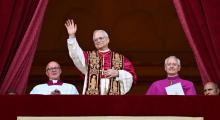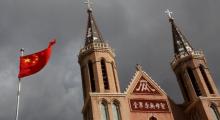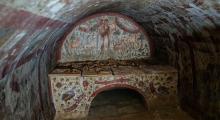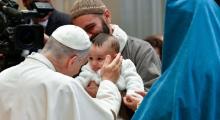Issued by the Catholic Center for Studies and Media - Jordan. Editor-in-chief Fr. Rif'at Bader - موقع أبونا abouna.org
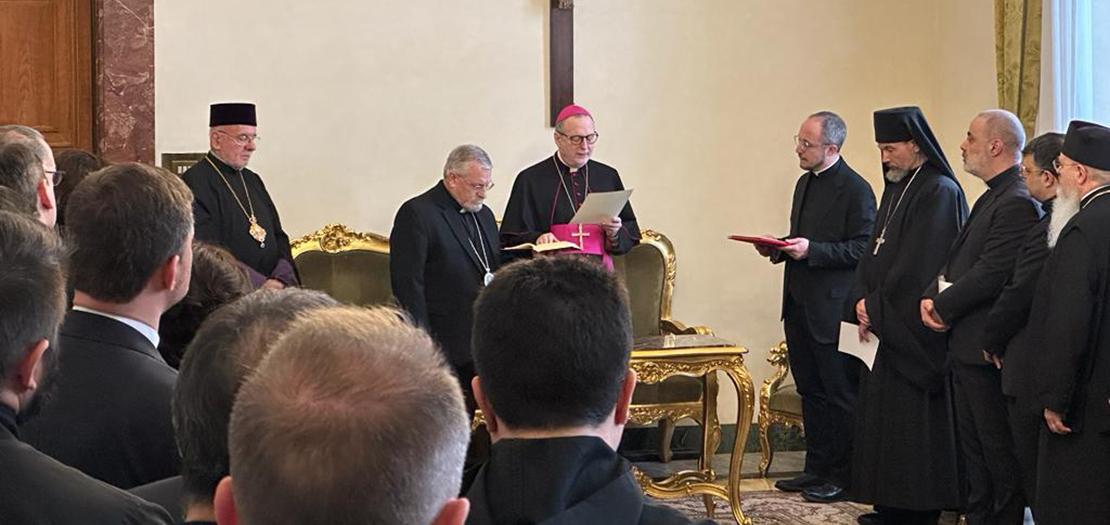
For the role of prefect of the Dicastery for the Oriental Churches, Pope Francis has chosen Archbishop Claudio Gugerotti, who since 2020 was nuncio to the United Kingdom.
The Italian prelate’s diplomatic career came about somewhat “by accident.”
As a specialist in Eastern liturgy and a fluent Russian and Armenian speaker, Gugerotti arrived in Rome to serve in the Congregation of Oriental Churches, where he had served as undersecretary before starting his career as “ambassador of the pope.”
His recent appointment came as a bit of a surprise, given Vatican rumors were convinced that Cardinal Leonardo Sandri, 79 years old and head of the dicastery since 2007, would remain the prefect until he was 80.
As a possible substitute, there was talk of Cardinal Dominique Mamberti, a longtime diplomat and former Vatican “foreign minister,” who is now prefect of the Apostolic Signatura — the Vatican’s highest judicial authority.
Gugerotti’s profile was among those considered possible prefects but considered unlikely. A little for his well-underway diplomatic career: in London since 2020, he had been sent — he explained in an interview with Vatican News — to continue the dialogue between Catholics and Anglicans. Partly because his fluent knowledge of the Russian language and culture made him, in the eyes of many, too close to Russia and, therefore, ineligible in times like these.
This reading, however, risks being superficial. Gugerotti is an expert on Ukraine, having been nuncio to Kyiv from 2015 to 2020. But he is also an expert on Russia and how Russian politics moves. So when as nuncio he spoke about the conflict in the Donbas region of Ukraine, long before the large-scale Russian aggression on Ukrainian territory, he did so in terms that very much reflected the diplomatic line of Pope Francis.
In the end, there are three reasons why Archbishop Gugerotti was chosen as prefect of the dicastery:
- His experience and knowledge not only of the Eastern Churches but also of post-Soviet politicians.
- His diplomatic doctrine.
- The role that the Dicastery for the Oriental Churches can play.
The experience of Archbishop Gugerotti
Gugerotti, 67, arrived in Rome to serve in the Congregation of the Oriental Churches after attending Eastern theology and liturgy for three years at the Institute of Ecumenical Studies in Verona.
He remained in the dicastery until 2001, becoming undersecretary in 1997.
Then, Pope John Paul II appointed him nuncio to Georgia, Armenia, and Azerbaijan, a position he held from 2001 to 2011. He was in Tbilisi when, in 2008, there was the Russo-Georgian War, and therefore he learned about the Russian way of operating.
In 2011, Benedict XVI appointed him nuncio to Belarus. There, he was able to visit political prisoners, negotiating directly with President Aleksandr Lukashenko. This confidence in the Belarusian president came in handy at the end of 2020 when Pope Francis sent him to Belarus to speak with Lukashenko and negotiate the return of Archbishop Tadeusz Kondrusiewicz of Minsk, who had gone abroad for a series of celebrations and was then prevented by authorities from returning to his homeland.
He had been unable to return home because — it was said — his passport had expired. Gugerotti succeeded in the mission, and Kondrusiewicz returned in time to celebrate Christmas, then left his place when he turned 75 on January 3, 2021.
From 2015 to 2020, Gugerotti was nuncio to Ukraine. Unfortunately, he inherited a situation of conflict that arose following the Russian annexation of Crimea. Nevertheless, he was able to reach the conflict zones, even celebrating one Easter in the Donbas. In addition, he was among the coordinators of the “Pope for Ukraine” initiative. But, above all, he has consistently called for a Russian-Ukrainian reconciliation that goes beyond politics and political needs.
His ability to see competing perspectives is also due to his excellent knowledge of the Russian language and made him a candidate to hold the position of prefect of the Dicastery for the Oriental Churches.
Gugerotti’s positions on the war in Ukraine
To understand Archbishop Gugerotti’s diplomatic doctrine, one must reread his statements during the conflict in the Donbas region.
In December 2019, the Paris summit brought together Russian President Vladimir Putin and Ukrainian President Volodymyr Zelenskyy, with French Prime Minister Emmanuel Macron and then German Prime Minister Angela Merkel in the French capital.
Commenting on the results of that meeting, Gugerotti stressed that “Ukraine, in the conflict territories in the Donbas,” needs to live “a true experience of reconciliation; otherwise, there is no way out. So the situation is buffered, but an open-air cemetery is preserved.”
Even then, the nuncio said that the conflict represented “a situation of eternal precariousness. The bombing continues.” Gugerotti noted how this affected children and how it was difficult to find medicines and food, and to ensure heating.
In short, the nuncio decried the pathological precariousness of the situation.
Gugerotti also asked Europe to be less distracted, even just “for the moral commitment” it had, given that Ukraine had chosen European values: ”A choice that costs a lot in terms of human lives and a very high economic price.”


